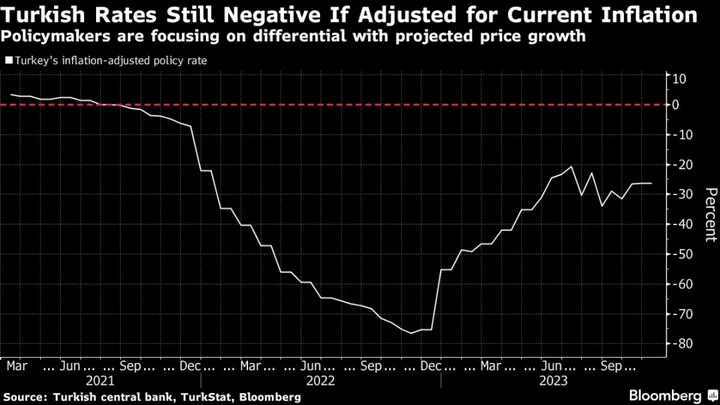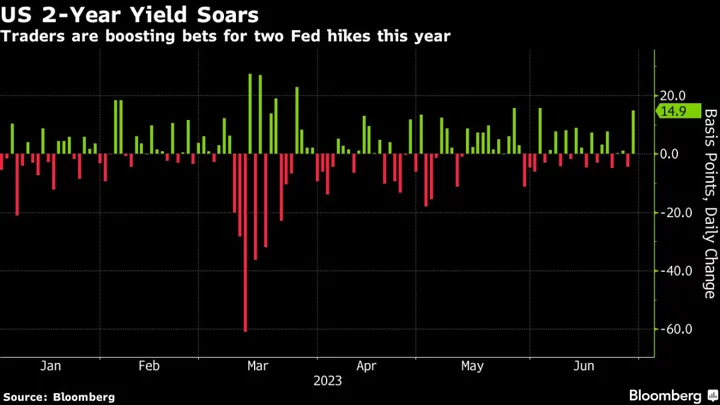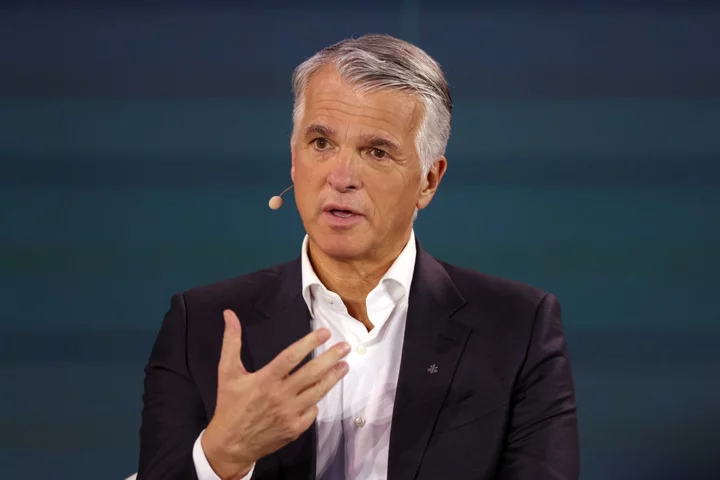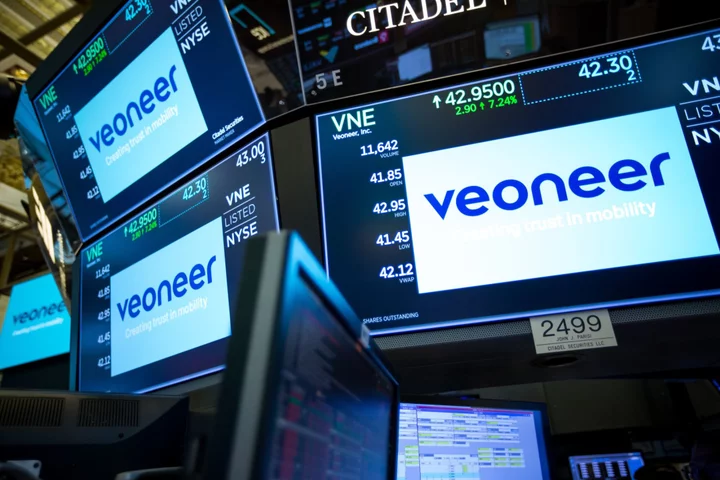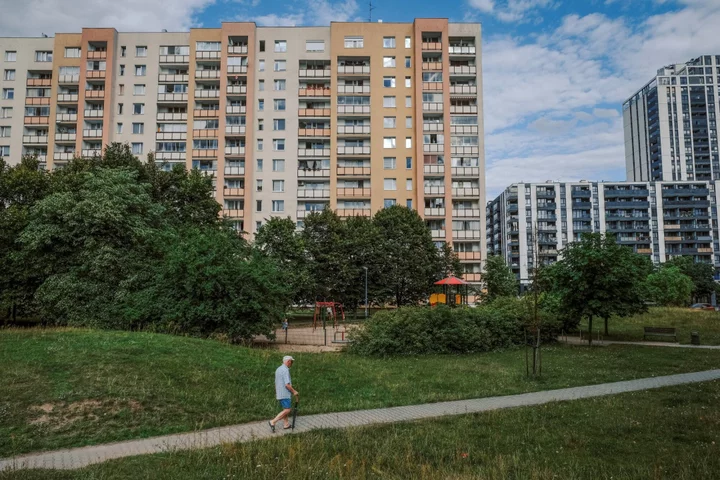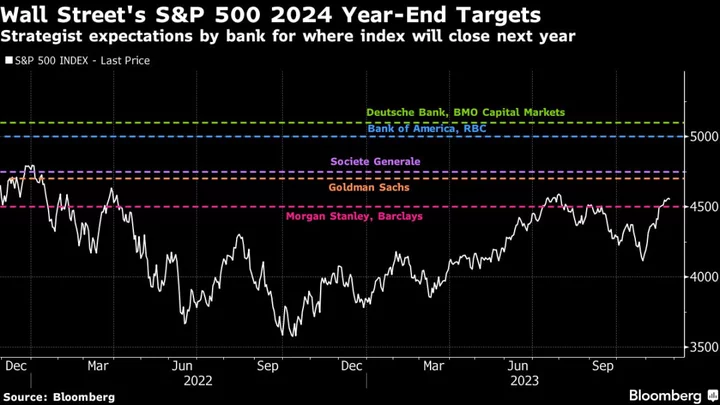Turkey is turning another corner in ending an era of ultra-loose monetary policy.
The central bank will likely take interest rates above zero relative to an inflation measure preferred by policymakers, after keeping them deeply negative for more than two years when adjusted for current prices. Looking ahead, the pace of rate hikes is set to slow following increases of up to 7.5 percentage points in recent months.
Five steps into a monetary tightening cycle started in June and with inflation topping 60%, Turkey’s real rates are still the world’s lowest among more than 50 economies tracked by Bloomberg. But officials like Finance Minister Mehmet Simsek have argued they are focusing on the differential with the projected path for prices rather than their present level, a view that suggests policy is already tighter than would appear otherwise.
A fresh outlook recently unveiled by the central bank means a hike this week is all but certain to nudge rates past 36%, which is forecast as next year’s endpoint for inflation. Every economist surveyed by Bloomberg sees an increase in the benchmark from 35%, with predictions for the move ranging from two to five percentage points.
The decision on Thursday will resonate in a market that’s increasingly sensing an opportunity for outsized returns in Turkey if the central bank stays the course after a makeover of economic policies following President Recep Tayyip Erdogan’s reelection in May. Some of the world’s largest investors like Amundi SA are looking for a rate increase to at least 40% before pouring money into local debt.
Turkey’s shift of real rates into positive territory could lead to a revival of the carry trade, in which investors borrow in currencies where interest rates are low and invest in the local assets of countries where they are high. JPMorgan Chase & Co.’s models suggest the currency is “meaningfully cheap,” implying the potential for a 20% annual return.
The symbolic milestone of achieving positive real rates by at least one indicator hinges on the accuracy of the official outlook, which is more upbeat than the views of many economists and the central bank’s own survey of expectations.
And with local elections approaching next March, another takeaway for investors is that the pace of Turkish rate hikes is now set for a downshift given that financial conditions may soon be deemed sufficiently tight. Governor Hafize Gaye Erkan has declined to say when she expects rates to turn positive relative to current inflation.
“It will likely prompt the central bank to proceed with smaller steps to keep the economy on a gradual adjustment path,” Morgan Stanley economist Hande Kucuk said in a report. “We will be watching the statement for any signal for a slowdown in tightening.”
A period of abnormally low rates has created economic distortions by heating up domestic demand, driving out foreign investors and generating imbalances in trade that have been a drain on reserves. It’s also left the lira chronically vulnerable by depriving it of a buffer against market selloffs.
Since Erkan took the helm almost half a year ago, the central bank has more than quadrupled its benchmark but still anticipates that price growth will peak only next May at as high as 75%. The governor has said “monetary tightening will continue until a marked improvement in inflation.”
In combination with other steps that simplified banking regulations in favor of more conventional measures, the effort has improved the transmission of rates into the economy.
But although average lira deposit rates for up to three months are now at the highest in two decades with an increase to over 45% in November, their pick-up has slowed, prompting Bloomberg Economics to reverse its call for a hold this week and predict a hike instead.
What Bloomberg Economics Says...
“Additional policy tightening is on the cards. We see that materializing as a 200 basis-point hike, as well as a more restrictive stance on alternative tools such as reserve requirements and regulation governing credit and deposits.”
— Selva Bahar Baziki, economist. Click here to read more.
Other risks abound for inflation. Higher consumption of gas, coupled with an expected increase in the minimum wage in January, threaten to push up price increases.
The central bank assumes a negative output gap, where the economy is producing less than its long-term capacity, will open up from the second quarter of next year, the point at which a demand deficit should start to hold back inflation.
The emphasis of policy efforts needs to be on reducing local demand for foreign exchange, according to Tepav, an Ankara-based think tank that includes former officials such as Fatih Ozatay, an ex-deputy central bank governor.
“The bank should hike rates to 40% and signal more tightening if developments warrant that,” Tepav economists said.
--With assistance from Joel Rinneby, Beril Akman and Kerim Karakaya.
(Updates with JPMorgan’s analysis in sixth paragraph.)

